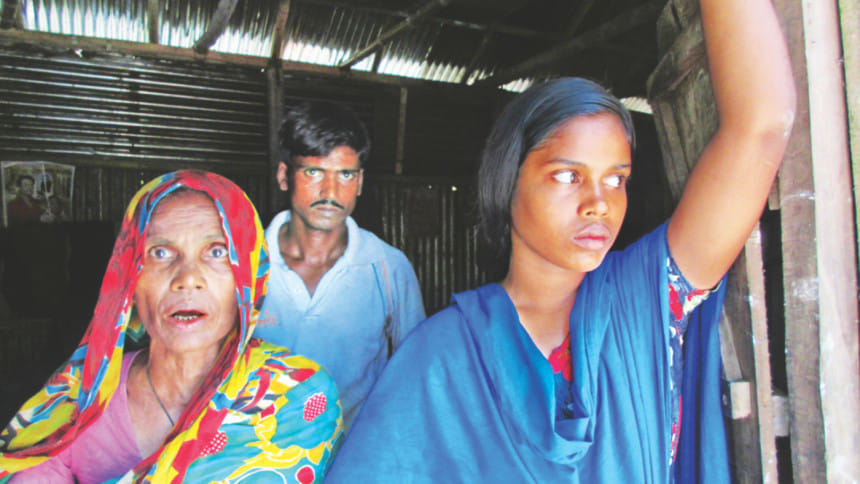She stays back for a grave

It's a grave that is going to split 60-year-old Shamsunnahar from her children, probably forever and beyond boundaries.
When the decision to end the enclaves were made and the time came to opt for a country the enclave dwellers want to be part of, Shamsunnahar found all her children lined up to become Indian citizens. After all, they live in an enclave that is officially part of India, Dashiarchhara. And above all, India beacons with her bigger and vibrant economy.
Only she refused to go. How can she leave her dearest husband lying in the backyard grave? The brave husband who in 1971 fought side by side with Bangladeshi freedom fighters against the Pakistan army although he was an Indian. He fought in sector 6 and took part in the bitter battle in Raiganj where Lt Ashfaqus Samad died.
And he received freedom fighter's allowance despite being an Indian citizen, thanks to the effort of his Bangladeshi neighbours.
“It breaks my heart to see my children going off to India,” Shamsunnahar sobs bitterly. “Tell me, do you think it is easy to send your children away to another country? Only god knows how they would fare out there. May be they would be happy. But I won't go. My husband is here.”
Her three sons and two daughters are eagerly waiting for the day they would leave for India. They have all signed up for migration once the enclaves cease to exist two days from now on July 31 midnight. Only the youngest son Khairul will stay back to take care of his mother.
“Why do I want to go? Because there is simply nothing to do here,” says her second son Shahjahan. “We have no land. So I cross the border by bribing agents and work in brick kilns. Each time I go, I have to pay five to six thousand takas to the agents and then cross the barbed wire on the borders by digging the ground. It's risky. If the Indian border guards catch me, they will shoot me. So it is better I become an Indian citizen and go there legally.”
His younger sister Asma Akhter will go with him too. She has just appeared in the higher secondary exams and the result will come out next month.
She is both excited and hesitant.
“I don't know what I will do there,” she said uncertainly. “Will they recognize my education here? Can I get into a university or college? Will my education certificate carry any value? I got 3.65 GPA in SSC. I want to go because I find no future here. Even I had to fake my address to study. I can't take it anymore.”
Then she stopped and looked down. She was drawing doodles on the ground with her big toe.
“We are going to a big country, that's the good side. But I am leaving the country where I grew up. That's sad,” then she looked up again and asked, “Do you know if there is still time to cancel the decision to go to India? Can I still change my heart?”

 For all latest news, follow The Daily Star's Google News channel.
For all latest news, follow The Daily Star's Google News channel. 



Comments